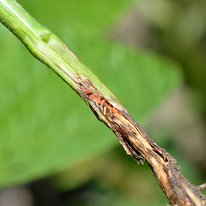Current and developing pest management issues faced by southwest Minnesota crop producers drive our research. Integrated pest management (IPM) applied research focuses on the interactions between crop pests (insects, nematodes, plant disease, and weeds) with crop growth and yield. Minnesota crop production continues to see new crop pest species complicating management decisions and established pests continue to adapt and develop resistance to current management practices. Our research explores new management technologies but also examines ways to integrate existing and traditional pest management methods to reduce economic yield losses from pests.
We evaluate host plant resistance, crop protection chemistry, cultural practices (e.g. planting date, crop rotation), and other tools to identify multifaceted pest management strategies. These integrated strategies help producers manage pests in an economical and environmentally conscious manner that preserves management options.
Strong collaboration with University of Minnesota and regional research and extension faculty, commodity groups, the seed and agricultural chemistry industry, crop advisors, and southwestern Minnesota producers helps us produce relevant and robust research and extension products.
We provide the following resources relating to crop and pest management:

